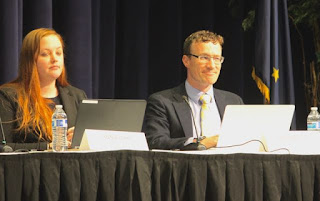Morning so far has included
Board discussing how they want to learn the mapping software during the day today
Testimony by:
James Squires Gulkana
Tom Begich - State Senator and very involved in past two redistricting processes
Rhonda Pitka - Village of Beaver
Aaron Shutt - CEO Doyon
It's 10:38 now and the Board members are working together and individually on their computers to create districts in SE Alaska. Basically, this is a learning exercise so they can get skilled on the mapping software. They are each asking questions and staff are giving suggestions for what to do.
Here are my notes from this morning. Of most substantive interest is the testimony. Regular disclaimers: these are rough notes, a guide to what's happening at the Board, but not verbatim and not without errors.
AK Redistricting Board Notes
Aug. 24, 2021
Meeting
9am - 10:15am
9:17 Peter Torkelson demonstrating online website.
9:44 Board has been talking about the new software and how they want to learn the software.
9:48 Board is going to take public testimony - looking for people on line who might want to testify. Two people in line
9:50 James Squire, Gulkana District 9 describing district. Even to Whittier - we have little in common - people living in Super Cold down to Whittier. Delta to Valdez - north of Alaska range to Whittier and Palmer. Distance to travel from one part to another. Need something more reasonable, similar climates, life style. They drive to Fairbanks, NOT Palmer. Alaska Range is important boundary. I understand you need to get population. Alaskans in Palmer have little to do with what goes on here. We go to FB and FB comes to us for recreation.
John: Thanks very much appreciate the detail and brevity. If you’ve been looking online, can you give the online mapping project
Nicole - Thanks for excellent, precise testimony.
James Squire - We don’t go to Fred Meyers in Palmer, Go to Fairbanks. Difference between -4 and -50.
Sen. Tom Begich, from Anchorage - Thanks for letting me testify. Couldn’t yesterday. Commend you on your process. I’ve served in 2001 and 2011 cycle. First - caution, if you separate into group you’ll run into interlocking puzzle problem when you put them together.
- Two piece criteria - Federal and Constitutional guidance. There are no existing districts. They are built by scratch. We start by looking at Burroughs because they are by definition socio-economic integrated. You talked about starting with SE because has only one direction to go. Having done that, there is a way to have a core district with Yakutat.
- Mr. Squires says Delta should be connected with FB. He’s right. No reason for Delta or Valdez to be connected with FB.
- Matsu has to find that .6 percent and Anchorage will too, while Kenai and FB have to shed population. Anchorage 15.8 will have to go south to get the extra population. It can be done.
- Matsu won’t be able to go south to Anchorage.
- Heard Doyon testimony. Areas of Doyon region required by 39 can be returned to Doyon.
Starting with Socio Economic first, existing districts are irrelevant.
Start with SE
Take testimony.
John: Thanks Senator, that was a lot to absorb. Couldn’t follow it all. You have a lot of experience.
Melanie: Thank you. For those not familiar with this, we have to follow Alaska Constitution, that we start with blank slate, look at Constitution.
Nicole: Specific recs for Delta and Valdez. Repeat?
Tom: Palmer has grown. Control of six seats. Valdez, the largest pop center and Delta neither required by Palmer. Move Cordova into broader district with Valdez. Another thing: Courts fairly strict of socio-economic relationship. We tried to use community councils but courts said no, the whole city. But because Fairbanks City was an elected govt. inside the Borough so it was given consideration.
Including Valdez in anchorage district struck down in 2001 because they had no relationship.
John. Thanks. You said not be relying on existing districts, just socio-economic aspects. To me it’s intuitive because they’ve passed Court scrutiny. They were binding. Why not use that as a starting point.
Tom: Court ruled that Anchorage by definition is socio-economic area so line can be drawn anywhere. In that criteria, massive deviation with new data. In outlying areas . No inherent right of district to exist. But socio-economic unit does have right. You do have natural districts - Nome area - but if you start there you ignore the socio-economic as most important. You can use the districts to guide you. You can have deviation within 5 points. Start with Constitution criteria - socio-economic integrated, contiguity, compactness.
Ronda Pitka from Village of Beaver - Testifying on behalf of Beaver Village council. Heavily rely on. Support of strong consideration of work of Sealaska, ?????, to advance or suppress political power of Alaska Natives has been considerable. We should be able to hold reps accontable. In past, we’ve been fractured in deference to Fairbanks. If map of unfractured representative. Doyon and partners have looked at river systems, local boundaries. ??
Melanie: Thanks for calling in and testifying.
John: Audience wish to testify?
Mr. Aaron Shutt CEO Doyon (https://www.doyonutilities.com/leadership/aaron-m-schutt)- Thanks mr. Squires. The work we (Doyon) are doing supports Mr. Squires. Interior is one socio-economic unit. Rural parts of Alaska always come together. Also share with Board, resources to board. If you have questions for us we’re here to help. We have a great team.
John: natural time for break. Till 10:30
1:20pm
I decided to go home during the lunch break to see how this works online. You can watch here: http://akleg.gov/index.php#
There were some redistricting board sessions done via phone last time, but I don't remember any live stream video. It makes the meetings much more accessible to the world, and my blogging not quite as important.

.jpeg)







































